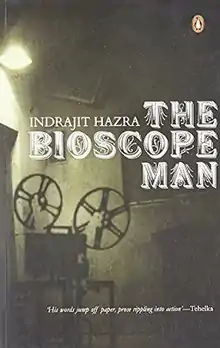The Bioscope Man
The Bioscope Man is the third novel by Indian author Indrajit Hazra. It is set in Calcutta and was published by Penguin Books India on May 1, 2008,[1] translated into French the following year by Marc Amfreville.[2][3]
 | |
| Author | Indrajit Hazra |
|---|---|
| Country | India |
| Language | English |
| Genre | Novel |
| Publisher | Penguin Books India |
Publication date | 1 May 2008 |
| Media type | Paperback |
| Pages | pp 308 |
| ISBN | 9780143101741 |
Plot summary
The Bioscope Man is about the recollections of Abani Chatterjee, a washed-out silent-era movie actor, who, through this book, makes a bid to convince the reader that misfortune and bad taste of the times conspired to turn him into a non-entity.
Characters
- Tarini Chatterjee: Abani's father, a senior clerk at East Indian Railway.
- Shabitri Chatterjee: Abani's mother, a housewife.
- Adela Quested: Daughter of Tarini's boss at Great Eastern Railway, Edward Quested
- Shombhu Lahiri (Shombhu-mama): Abani's uncle, chief projectionist at the Elphinstone theatre, who introduces him to the bioscope world.
- Durga Devi/Felicia Miller: Actress who would co-star in bioscopes with Abani.
- Lalji Hemraj: Businessman who starts the Alochhaya Theatre and Bioscope Company.
- Fritz Lang: Austrian filmmaker who comes from Berlin to Calcutta to make his 'India film'.
- William Jones: 18th century English scholar of ancient Indian texts and founder of the Asiatic Society.
- Ramlochan Sharma: Sanskrit and grammar tutor to William Jones.
- Anna Maria Jones: Wife of William Jones.
- Kuli: Girl who conducts daily chores for Ramlochan.
Reception
The Bioscope Man was well received by critics across India. In a piece published on 12 June 2009, India Today wrote: "What lies behind the screen? — journalist and novelist Indrajit Hazra’s The Bioscope Man sneaks us adroitly past the cameras of the silent film industry and exposes with a wacky and trenchant black humour the bathos, the pathos and the incredible magic of the moving image in the heart of Bengali-land about a hundred years ago."[4]
Hindustan Times praised the novel on June 2, 2008. In a piece entitled "The truth will set you free," the paper wrote: "Hazra has comic flair, heavily underlined by black humour. The funnier bits often come as asides, almost as if they were being spoken from the corner of his mouth."[5]
The Book Review magazine praised Hazra's craft of telling a powerful story and his use of English language in a creative and artistic manner. [6]
The French translation of the novel was reviewed on the La PAL D'Heclea literary blog.[7]
Preceded By
Indrajit Hazra also published The Burnt Forehead of Max Saul (Ravi Dayal Publisher, 2000) and The Garden of Earthly Delights (India Ink, 2003). Both novels were also translated into French.[8]
References
- See Penguin India's page on The Bioscope Man http://www.penguinbooksindia.com/en/content/bioscope-man
- Hazra's author page on his French publisher's website http://www.cherche-midi.com/theme/Le_roi_du_cinema_muet-Indrajit_HAZRA-9782749113906.html
- http://loumanolit.canalblog.com/archives/2010/08/31/18730372.html
- "Silence in the city" http://indiatoday.intoday.in/story/Silence+in+the+city/1/9739.html
- "Archived copy". Archived from the original on 2010-06-29. Retrieved 2015-07-05.CS1 maint: archived copy as title (link)
- "Archived copy". Archived from the original on 2014-06-06. Retrieved 2013-06-09.CS1 maint: archived copy as title (link)
- http://hecleaspal.canalblog.com/archives/2009/09/08/14996517.html
- See Hazra's bio on Penguin India's website http://www.penguinbooksindia.com/en/content/indrajit-hazra